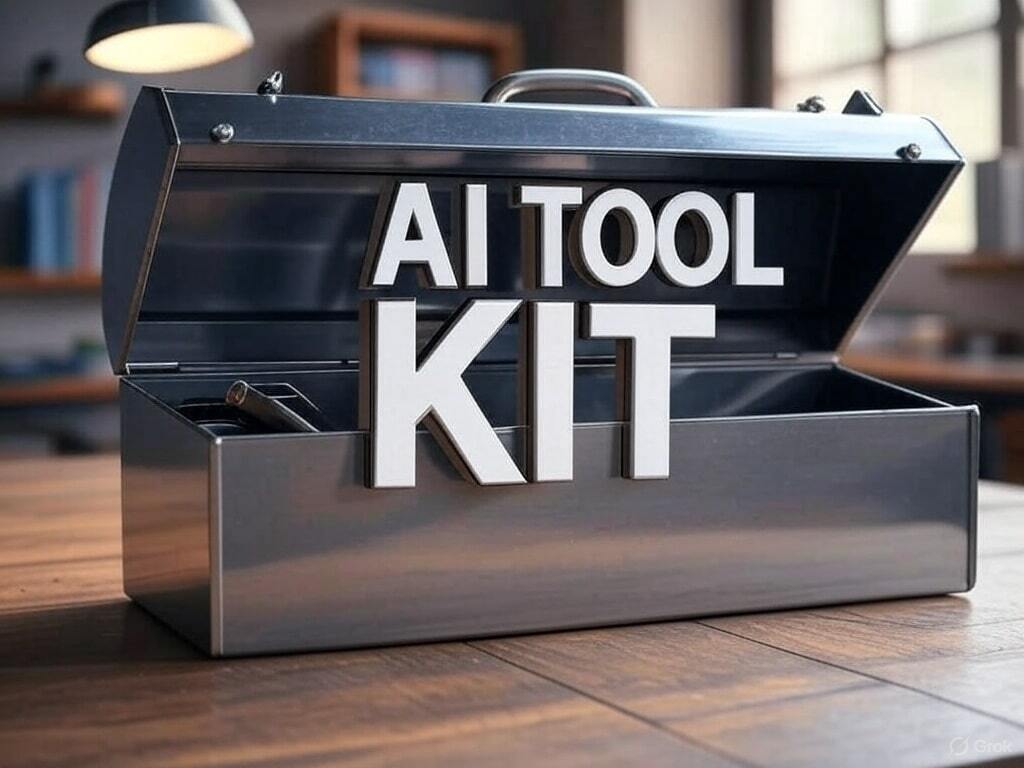- AI Biz Hour
- Posts
- ChatGPT-5 Released: A New Era of AI Democratization and Practical Applications
ChatGPT-5 Released: A New Era of AI Democratization and Practical Applications
AI BIZ HOUR NEWSLETTER Episode #199 - August 7, 2025

TODAY'S HIGHLIGHTS:
ChatGPT-5 has been released, marking what many participants called an "event horizon" in AI development
Umesh shared a powerful personal story about how AI helped his sister's cancer recovery journey
Detailed tutorial on using GitHub repositories with ChatGPT's agent mode to maximize productivity
First-hand experiences with GPT-5 show remarkable improvements in problem-solving, look-ahead capabilities, and complex API debugging
Discussion of Ray Kurzweil's exponential growth curve and what it means for our technological future
INTRODUCTION:
Welcome to the AI Biz Hour, where hosts Andy Wergedal (@andywergedal) and John Allen (@AiJohnAllen) explore the cutting edge of AI business innovation. Today's episode focused on the just-released ChatGPT-5, with participants sharing their first impressions, practical applications, and the profound implications of this new model. The conversation revealed not just technical improvements but also deeply personal stories of how AI is transforming lives, suggesting we've entered a new phase in the AI revolution that Umesh described as "slowly at first, and then all at once."
MAIN INSIGHTS:

ChatGPT-5: First Impressions and Capabilities
Multiple participants shared their early experiences with GPT-5, having gained access just hours before the show. The consensus was that GPT-5 represents a significant leap forward, with several standout capabilities:
Real Lucas described testing GPT-5 against other models (Claude, Gemini 2.5, GPT-4) on the same coding problems and found GPT-5 demonstrated impressive "look-ahead capacity." Unlike other models that simply solve the immediate problem, GPT-5 anticipates next steps, suggesting follow-up actions like Git commands and SQL queries that would logically come next in the workflow.
Umesh, who gained API access during the show, shared a remarkable debugging success story. His team had been struggling with a complex travel industry API integration bug for two months, even hiring external consultants without success. He simply pasted the code into GPT-5 along with documentation from his GitHub repository, and GPT-5 fixed the issue on the first attempt. "It works just out of the box," he reported, demonstrating GPT-5's ability to handle complex, real-world programming challenges.
Andrew noted that GPT-5 completed a complex UI kit development task in "one shot" without requiring interaction or interruption. He also observed that GPT-5 feels more like a companion than previous models, providing more thoughtful guidance rather than just generating tokens.
The interface simplification was also highlighted as a significant improvement, with Umesh noting: "One of the biggest things they have done is the ChatGPT interface where they have removed all these [model options] and you have very simple GPT-5... That's what people want."
Maximizing GitHub and ChatGPT Integration: A Step-by-Step Guide
Umesh provided a detailed tutorial on leveraging GitHub repositories with ChatGPT's agent mode, emphasizing this workflow isn't just for developers:
Set up a GitHub repository: "GitHub is a place where you can store your code, but it's not only for storing code. You can store anything there." Register for a free GitHub account and create a private repository (folder) to store your files.
Upload your content: Whether you're a writer, musician, or any other professional, upload your work to the repository. For example, if you're a copywriter, upload your best ad copies or blog posts.
Connect ChatGPT to GitHub: In ChatGPT, click the plus button next to "Ask anything," select "Agent mode," then choose "GitHub" from the sources dropdown. Follow the authentication process to connect your GitHub account.
Select your repository: Choose which repository you want the agent to work with.
Assign complex tasks: Ask ChatGPT to analyze your content and create new work based on your style. For example: "These are my 10 best blog posts. Apply the latest SEO principles and write a new post in my style on this topic."
Umesh emphasized that with a $20 ChatGPT subscription, users get approximately 39 agent credits per month. "Use them every day. Set yourself a complex task that you want to get done. If you're not using those 39 credits of agentic workflow that you have, you are missing out on something big."
He demonstrated the power of this approach with a personal example, asking ChatGPT to find a specific flight from London to India with precise requirements: one-stop only, travel between December 1-31, return by end of February, and only Airbus aircraft. The agent searched multiple websites and returned detailed options including aircraft models and seat types.

AI's Impact on Healthcare: A Personal Story
In one of the most moving segments of the episode, Umesh shared how AI helped his sister overcome stage 4 cancer:
"Yesterday my sister had the fourth quarterly check for her cancer situation. She was in the hospital... and she carried out all the tests. She uploaded everything because I taught her how to do it. She's not tech-savvy at all. She's an artist. By the time the doctor came in to tell her what the news is, she already knew."
His sister had used both ChatGPT and Gemini to analyze her medical reports. Gemini was particularly helpful as it could communicate with her in Gujarati (her native language), explaining the results in simple terms and suggesting questions to ask the doctor. The doctor was amazed by her understanding of the situation.
The news was excellent: "The cancer is completely gone from her body. She's free of cancer, 100% now." Umesh explained that AI played a crucial role in her recovery journey: "In one year, to move from multi-organ stage 4 lung cancer to zero cancer without radiotherapy, without chemotherapy."
He later elaborated that he had used AI to research over 1,000 medical and nutritional papers in different languages, creating a customized lifestyle regime for his sister focused on boosting her immune system. While he emphasized he's not medically trained, he believes this AI-assisted approach might help others facing similar challenges.
The Exponential Growth of AI and Its Implications
Michael referenced Ray Kurzweil's exponential growth curve, suggesting we've reached the steep vertical portion of the curve where technological advancement accelerates dramatically. "We are at the rate now that it is growing at such a large factor. If you were to look at the line, it literally is going straight up."
This led to a discussion about the "unfathomable" future ahead, with Umesh expressing: "We are looking at something big here... Imagine thousands and thousands of products over the next 6 months, products and services getting raised in the market and changing the way people live and work and think and do stuff and enjoy and entertain themselves and learn. Everything changes."
Real Lucas, who mentioned having worked with Kurzweil in the past, described him as "a prophet" who "wrote a lot of what we're dealing with right now" in his book "The Singularity is Near" about 20 years ago. The group discussed Kurzweil's optimistic view of technology and his personal quest for longevity through nutritional supplements and lifestyle optimization.
Token Optimization and Context Engineering
Jason discussed the importance of token optimization and context engineering, noting that many AI tools burn through tokens unnecessarily: "If you just start the coding tool up and say hello... typically you'll burn 25, 30,000 tokens straight away because it's setting up all this shit to do with the system prompts and tooling."
He suggested that "context re-engineering" is needed, where context is tailored for each specific call rather than using a one-size-fits-all approach. Through simple tests, he's achieved 90% token savings "without losing any quality."
His approach includes:
Optimizing prompts to be more efficient
Controlling and limiting output verbosity
Using code-like responses instead of verbose explanations
Forcing structured outputs like JSON
Tokenizing rules in system prompts
Jason emphasized that smaller, specialized models can be more efficient for specific tasks: "You don't need to be burning the expensive tokens or using a reasoning model to operate a drill."

FEATURED TOOLS & TECHNIQUES:
ChatGPT-5: The newly released model from OpenAI showing significant improvements in reasoning, anticipation, and problem-solving
GitHub + ChatGPT Agent Mode: A powerful workflow for leveraging AI with your existing content repositories
LM Studio with MCP Support: John mentioned this tool for running local models with Model-Calling Protocol support
Token Optimization Techniques: Methods to reduce token usage by 70-90% without sacrificing quality
Gemini for Multilingual Communication: Highlighted for its ability to communicate effectively in regional languages and dialects
EXPERT CORNER: Umesh on AI Democratization
Umesh provided a philosophical perspective on what GPT-5 represents: "When ChatGPT was launched, we were at 'slowly.' When GPT-4, 4.5 came in with Gemini and everything, we crossed 'at first.' And GPT-5 has now crossed them. And now we are entering the phase where you have 'all at once.'"
He emphasized that this represents true democratization of capabilities: "Imagine the power in the hands of people. It's unfathomable." This democratization extends beyond technical applications to healthcare, education, and other critical areas, potentially transforming how people access and utilize specialized knowledge.
The conversation highlighted how AI is shifting from a specialized tool to an everyday companion that augments human capabilities across all domains, making previously inaccessible knowledge and tools available to everyone regardless of technical background.
QUICK HITS:
Connect your GitHub repositories to ChatGPT's agent mode to leverage your existing content
Use your 39 monthly agent credits (with $20 subscription) for complex, high-value tasks
Try comparing different AI models on the same task to identify their strengths and weaknesses
Consider using smaller, specialized models for specific tasks to save on tokens and improve efficiency
Look for opportunities to use AI as a translator of specialized knowledge (like medical reports) for non-experts
Experiment with token optimization techniques to reduce costs without sacrificing quality
RESOURCES MENTIONED:
ChatGPT-5: Now available to subscribers
GitHub: For creating repositories of your content
LM Studio: For running local models with MCP support
Ray Kurzweil's "The Singularity is Near"
Kurzweil Curve: Visualization of exponential technological growth
Joe Rogan's interview with Ray Kurzweil
COMING UP:
Join us for tomorrow's Open Mic Friday where we'll continue exploring GPT-5 and other recent AI developments!
CONNECT WITH AI BIZ HOUR:
Website: aibizhour.com
Andy: @andywergedal
John: @AiJohnAllen
Show: @aibizhour
CALL TO ACTION:
Don't miss out on future insights! Join the AI Biz Hour community and subscribe to the newsletter at aibizhour.com to stay ahead in the world of AI business innovation. Share this episode with friends or colleagues who could benefit from the GitHub-ChatGPT workflow tutorial!
OUR SPONSORS:
Gov Bid Mike's Government Contracting Services

Tap into the $7 trillion government market opportunity
Prepare for upcoming AI procurement rule changes (October 2024)
10% discount for AI Biz Hour listeners
Specializing in American-made AI technologies and interoperability requirements
Visit biddata.ai to learn more
Join us tomorrow for our live session at 12 PM ET!
Reply